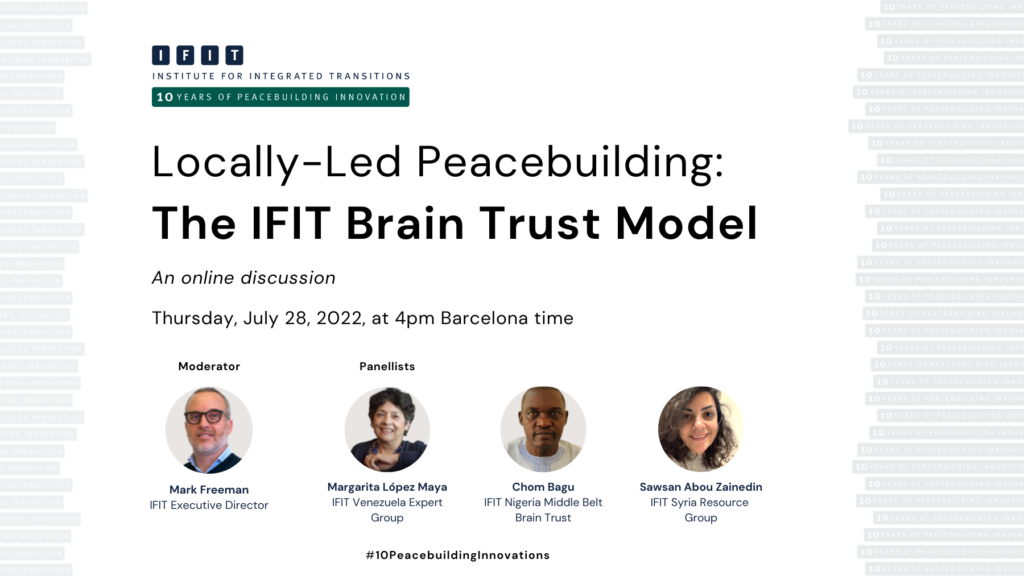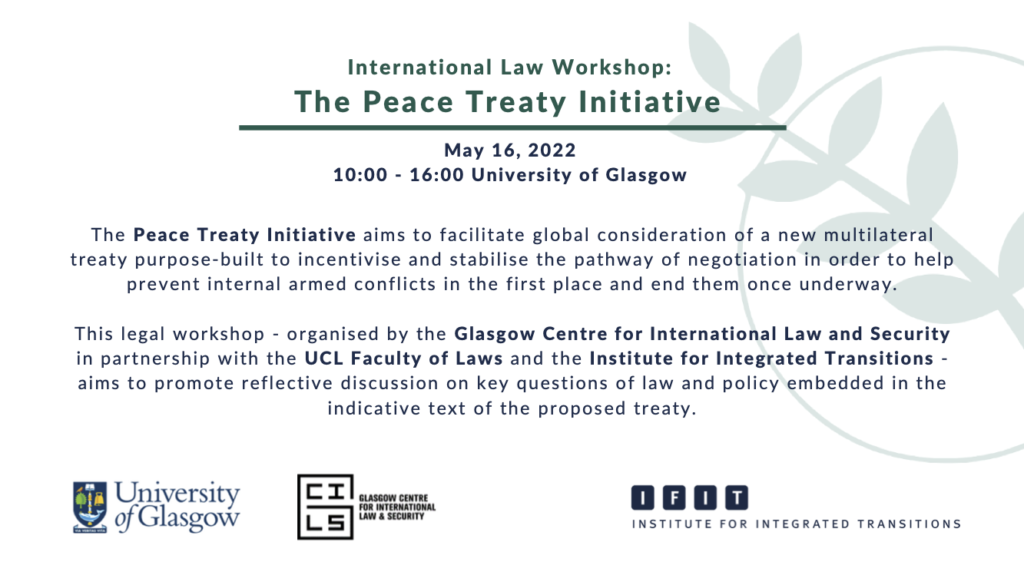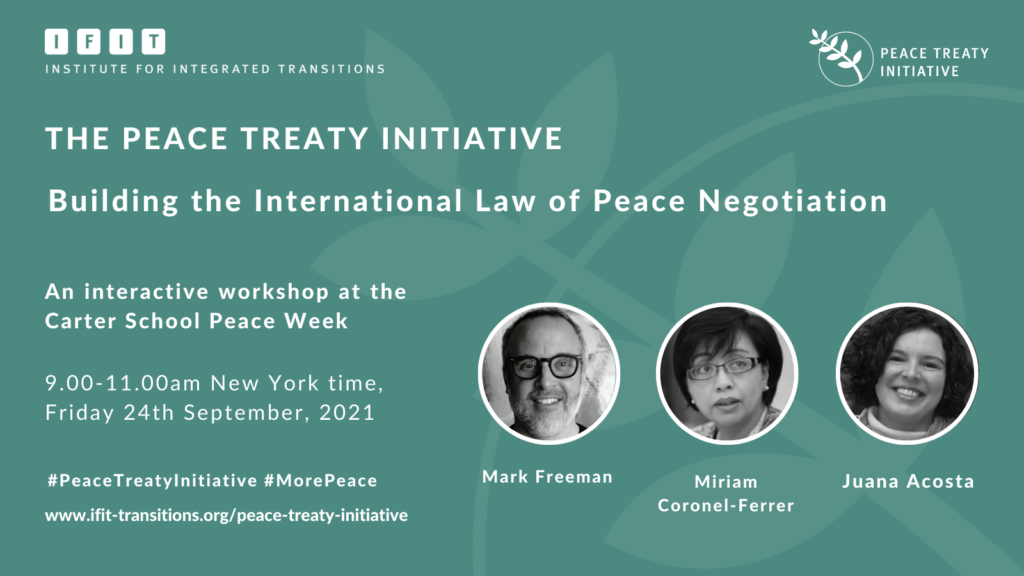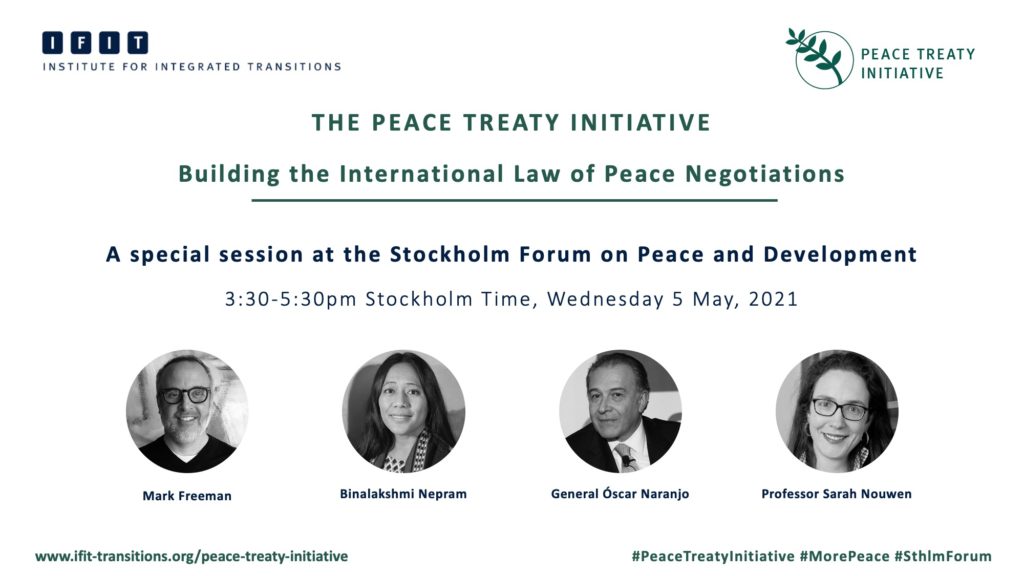


We are pleased to announce a new IFIT regional initiative.
Building on years of intensive IFIT work in individual countries ranging from Syria to Libya, Sudan and Tunisia, our inaugural Regional Programme for the Middle East and North Africa (MENA) adds a fresh layer of analysis and action to our existing work.
The programme aims to bring new ideas that can help expand the spectrum of perceived solutions to crisis and conflict in the region; bridge violent divides; and amplify expert voices on key regional issues of negotiation and transition.
We will be providing more information about the programme in the coming weeks and months.
IFIT’s Executive Director Mark Freeman and UCL’s Phillippe Sands joined Carlos Castresana at Fundación Rafael del Pino, to discuss questions of peace and justice in Ukraine.
Originally published by Fundación Rafael del Pino.
The Institute for Integrated Transitions (IFIT) is pleased to announce Partial Agreeements: The Functional Alternative to All-Encompassing Settlements, the latest webinar within our 10 Peacebuilding Innovations series.
In situations of entrenched conflict, it is common to seek comprehensive rather than limited deals when negotiating. However, the default to all-encompassing goals can be counterproductive since local, regional and global conditions seldom will be propitious to achieving them. An approach of multiple ‘partial agreements’ to ‘shrink the conflict’, instead of seeking its comprehensive end, may sometimes be the wiser choice.
In this webinar, IFIT experts will examine the potential advantages and risks of partial agreements within the context of armed or political conflicts, as well as the range of issues that might be suitable for such agreements.
Date: Wednesday, April 19 from 4:00pm-4:30pm Barcelona time
Registration: Please click here to receive the Zoom link to be able to watch the webinar.
Moderator: Colleen Gwazani, Coordinator, IFIT
Panellists:
10 Peacebuilding Innovations is a year-long series of events and initiatives to mark IFIT’s 10th anniversary. The events are led by diverse experts belonging to IFIT’s staff, brain trusts, practice groups, and governance bodies. Each event lasts 30 minutes and is held via Zoom.
The Institute for Integrated Transitions (IFIT) is pleased to announce Negotiating with Violent Criminal Groups: Lessons and Guidelines from Global Practice, the latest webinar within our 10 Peacebuilding Innovations series.
Negotiations with violent criminal groups – such as mafias, cartels, gangs and pirates – occur more often than imagined. Yet, most of the attempts are unknown, whether because they were secretly conducted, publicly denied, or both.
In this webinar, IFIT’s Executive Director will discuss key findings from IFIT’s ground-breaking global study of the subject. The study represents the most diverse set of negotiations with violent criminal groups ever examined in one place.
Date: Thursday, March 30 from 4:00pm-4:30pm Barcelona time
Registration: Please click here to receive the Zoom link to be able to watch the webinar.
Moderator: Luisa Meléndez, Research Assistant, IFIT
Panellist: Mark Freeman, Executive Director, IFIT
10 Peacebuilding Innovations is a year-long series of events and initiatives to mark IFIT’s 10th anniversary. The events are led by diverse experts belonging to IFIT’s staff, brain trusts, practice groups, and governance bodies. Each event lasts 30 minutes and is held via Zoom.
The Institute for Integrated Transitions (IFIT) deeply regrets to inform friends, colleagues, and partners of the tragic passing of Dr. Bassma Kodmani earlier today. The news is shared with a profound sense of loss and sorrow.
Bassma was not only a respected intellectual, academic, Middle East expert and women’s rights advocate, but also a renowned defender of a peaceful and democratic Syria.
At IFIT, she served with great dedication and honour for many years, both as a member of our International Advisory Council and as one of the founders of the Syria Resource Group.
The IFIT community extends its deepest condolences to Bassma’s family and friends, the members of the Syria Resource Group and all Syrians for this profound loss.
The Institute for Integrated Transitions (IFIT) is pleased to announce Building the International Law of Peace Negotiation, the third webinar within our year-long 10 Peacebuilding Innovations series.
The Peace Treaty Initiative is a major global undertaking that aims to establish a purpose-built multilateral treaty to help incentivise warring parties to choose the pathway of negotiation in order to prevent internal armed conflicts in the first place and to end them once underway. In this webinar, our expert panellists will discuss the origins and concepts underlying the initiative; explain how the treaty could help prevent and resolve armed conflicts in a more systemic manner; and describe the goals and outcomes of the ongoing global consultation process.
Date: Tuesday, December 6 from 4:00pm-4:30pm Barcelona time
Registration: Please click here to receive the Zoom link to be able to watch the webinar.
Moderator: Mariana Casij Peña, IFIT
Panellists: Sarah Nouwen and Hesham Youssef, members of the Expert Advisory Group, Peace Treaty Initiative
10 Peacebuilding Innovations is a year-long series of events and initiatives to mark IFIT’s 10th anniversary. The events are led by diverse experts belonging to IFIT’s staff, brain trusts, practice groups, and governance bodies. Each event lasts 30 minutes and is held via Zoom.
The Institute for Integrated Transitions (IFIT) is pleased to announce The Initiative on Apex Court Appointments – Filling the Gap in Guiding Principles, the second webinar within our year-long 10 Peacebuilding Innovations series.
An apex court is the highest judicial body on constitutional matters in a country, often dealing with politically-charged cases that have foundational consequences for democracy and the rule of law. In this webinar, we will examine key structural characteristics and roles played by apex courts in a democratic society and explain how IFIT’s Initiative on Apex Court Appointments is filling the current gap in global guidelines and criteria for the selection and appointment of judges to these unique courts.
Date: Thursday, September 8 from 4:30pm-5:00pm Barcelona time
Registration: Please click here to register and receive the Zoom link.
Moderator: Colleen Gwazani, IFIT
Speakers:
10 Peacebuilding Innovations is a year-long series of events and initiatives to mark IFIT’s 10th anniversary. The events are led by diverse experts belonging to IFIT’s staff, brain trusts, practice groups, and governance bodies. Each event lasts 30 minutes and is held via Zoom.
Philanthropic support or annual sponsorship of IFIT’s short and long-term growth – expanding its local, regional and global impact – is an investment in advancing peace, justice and security for all.
As long as human conflict exists, IFIT will have a substantive role to play. The success of peaceful transitions requires continued presence in volatile regions and countries before, during and after peace and political settlements have run their course.
IFIT helps usher in negotiation and transition processes that are more inclusive, resourceful, evidence-informed and collaborative. Ensuring IFIT’s continued leadership in this field will generate reforms to, and eventually bring about the evolution of, traditional peacebuilding techniques which are often fragmented or fall short of aspirations.
IFIT brings together under one roof the best of theory and practice in relation to successful negotiations and transitions out of conflict or authoritarian rule.
We hope this case for support offers the starting point for a deeper conversation regarding how we can work together to move current practice away from fragmented interventions and towards more integrated solutions to strengthen peace, democracy, and human rights.
To discuss your partnership with IFIT please contact Adriana Brassart, IFIT’s External Relations Manager, at [email protected].
IFIT’s uniqueness lies in the following combination of factors:
Picture: Moises Saman/Magnum Photos
The Institute for Integrated Transitions (IFIT) is pleased to announce Locally-Led Peacebuilding: The IFIT Brain Trust Model, the first online event to be held as part of our new 10 Peacebuilding Innovations series.
This event brings together three recognised local leaders from Nigeria, Syria, and Venezuela who will share their first-hand lessons in bridging elite and community-level processes of dialogue and peacebuilding. The event will include discussion of the critical – but often overlooked – role played by local go-between peacebuilders who “lead from the middle”.
Date: Thursday, July 28 at 4pm Barcelona time
Registration: Please click here to register and receive the Zoom link.
Moderator: Mark Freeman, IFIT Executive Director
Speakers:
10 Peacebuilding Innovations is a year-long series of events and initiatives to mark IFIT’s 10th anniversary. The events are led by diverse experts belonging to IFIT’s staff, brain trusts, practice groups, and governance bodies. Each event lasts 30 minutes and is held via Zoom.




